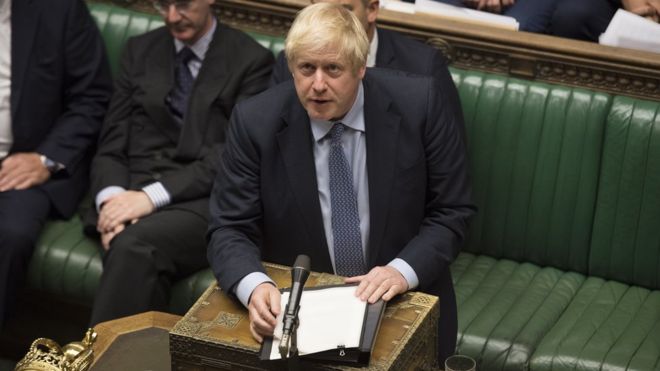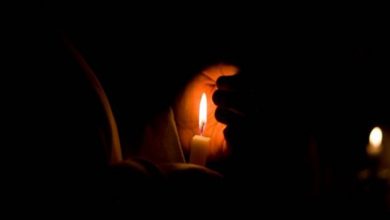International
Brexit: MPs to hold second vote on early election

The government is to ask MPs to agree to a snap election for a second time, in what could be one of Parliament’s last acts before being suspended.
No 10 has billed Monday’s vote as Labour’s “last chance” to secure an early general election.
But the government is expected to be defeated, with opposition parties wanting their law aimed at avoiding no-deal to be implemented first.
Boris Johnson is also due to meet Irish Prime Minister Leo Varadkar in Dublin.
The prime minister first called for a snap election after MPs – including rebel Tories – voted in favour of a bill requiring him to seek an extension to the Brexit deadline of 31 October if a deal is not reached before 19 October.
That bill is set to gain royal assent and become law on Monday, but has been criticised by ministers as “lousy” and weakening the government’s negotiating position with Brussels.
‘Test to the limit’
Ministers have said they will “test to the limit” the new law aimed at averting no-deal.
Foreign Secretary Dominic Raab said the government would abide by the law but will “look very carefully” at its “interpretation” of the legislation.
One plan under discussion is to formally request the extension while sending a second document making it clear the UK government does not want one.
Another potential option is to ask a sympathetic EU member to veto an extension.
France’s foreign minister, Jean-Yves Le Drian, said his country would not be able to support another Brexit delay “in the current circumstances”.
Meanwhile, Plaid Cymru has said opposition party leaders should try and impeach Mr Johnson if he ignores the no-deal law.
Downing Street said the vote, which comes ahead of this week’s shutdown of Parliament, was Labour’s last chance to secure an early election and have the chance to win its own mandate from the public to delay Brexit.
The motion, which requires the support of two-thirds of MPs, was defeated last week and is expected to fail again.
‘Serious about a deal’
It comes after Amber Rudd resigned as work and pensions secretary at the weekend, saying the government was spending 80-90% of its time on no-deal planning rather than trying to reach an agreement with the EU.
She told the BBC there was “very little evidence” the government would get a new Brexit deal, and when she asked for details of the efforts she received a “one-page summary”.
Former minister Rory Stewart, who resigned when Mr Johnson became prime minister in July, told BBC Radio 4’s Today programme there may be other unhappy cabinet ministers.
Asked about the idea of a new party made up of independent Conservatives, Mr Stewart said the current parties needed to be “genuinely broad”.
“Unfortunately the reality is that even were we to form an independent party, it could get as much as 15% of the vote of the population and not get any seats in Parliament,” he said.
“I believe what we should be doing is making the positive case to return the Conservative Party to the centre ground.”
Writing in the Daily Mail, Culture Secretary Nicky Morgan said “watching talented colleagues walking away from the cabinet table is never easy”, but she backed Mr Johnson.
She said the public was “exhausted and fed up” with “endless delays” and said that the no-deal option had to be kept on the table.
Ms Morgan said “the prime minister now needs to show he’s serious about getting a deal” and the government needed to display more transparency about its efforts.
An alternative to the Irish backstop, the insurance policy that prevents a hard border on the island of Ireland, is key to striking a deal, Ms Morgan added.
The UK government wants the backstop scrapped, because it would effectively keep the UK in the European customs regime and tie Northern Ireland to the rules of the single market.
But Ireland maintains the backstop, which comes into force if the UK does not agree a free trade deal with the EU, is the only way to avoid checkpoints.
Mr Johnson’s meeting in Dublin will be his first with the Irish taoiseach since he became prime minister.
Ahead of the visit, Irish finance minister Paschal Donohoe told the Today programme the talks were important – and it was up to Mr Johnson and his team to put forward their ideas for a replacement to the backstop.
Asked about suggestions for alternative arrangements such as technology to avoid a hard border, Mr Donohoe replied: “We have yet to see examples of how they would work, not only on our own island but indeed anywhere else in the world.”
And Mr Donohoe added that Ireland would be in favour of an extension to Brexit.
Meanwhile, Mr Varadkar played down expectations of an imminent solution to the border issue.
“I don’t think the meeting tomorrow is a high stakes meeting, as I don’t anticipate a big breakthrough tomorrow,” he said.
If an agreement is struck, it is more likely to happen in October at the EU summit, Mr Varadkar said.
The Irish prime minister has said he is open to a solution involving a backstop which only applies to Northern Ireland.
But the Democratic Unionist Party – Mr Johnson’s allies in Parliament – strongly opposes the idea.
Source: BBC



